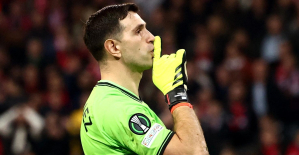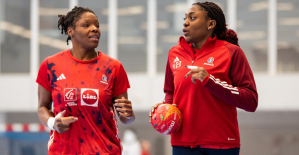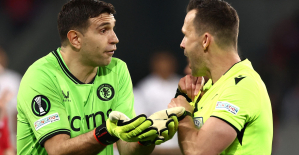Antonio Javier Martin (Granada 1987) is a wandering journalist and a restless type. He has been to 35 countries with his camera. He has been working in the marketing department at Granada Business Group for the past few years with his thesis about the Russian media system. He just published "Power and Media in Russia" (Aliar Ediciones).
-Never was a book so appropriate...
That's the way it is. Despite having spent seven years studying the Russian media market, the war has sparked increased interest in the topic. The publication, which was scheduled before the attack began, will allow me to understand more about what has been happening in Russia at a communicative and political level since the fall.
What has the impact of war on Ukraine on freedom of expression in Russia?
-Putinism has created a system that restricts press freedom for over two decades. It uses laws that can block a news agency in just a few hours. The restrictions on speech were increased after the military attack. Novaya Gazeta newspaper, a critical media outlet, decided to temporarily suspend itself to avoid a forced closure of their lives. Some others have chosen to disappear forever, such as Ekho Moskvy (a Russian radio station that is internationally recognized and most loved).
Antonio Javier had planned to launch the book before the Russian invasion. /GEORGE SHEPHERD
-You claim that Russia orchestrates the control over the media through its political and economic power. Who are the conductors?
-Media concentration has been steadily consolidating around the Kremlin, related banks, since the arrival of Putin. The Government has logically direct participation in major state communication groups such as VGTRK and semi-state media in the case Gazprom Media. These are directed by highly respected men like Alexander Zharov or Oleg Dobrodeev. The Russian government also has indirect control over private organizations owned by a new breed of Putin-connected oligarchs. Yury Kovalchuk is the owner of National Media Group via Bank Rossiya. This is the most significant case. Kovalchuk, who controls the media volume and the audience he reaches, would be the principal conductor if we use the analogy of a musical orchestra. In a second stage, Alexander Mamut, Vladislav Surkov and Mikhail Lesin are the main figures. Konstantin Ersnt and Dmitry Kysiliov and Margarita Simonyan, respectively, are also important in refining Putinism's media strategy.
How much is this information control affecting the Russian digital ecosystem?
The Russian government is clearly aiming to take control of the web's largest conglomerates. Rambler was recently purchased by Gazprombank and Sberbank, both state-owned banks.
Is information control a legacy of Soviet Union or a desire to see leaders like Putin impose authoritarianism on the world?
-Control of the media is essential for an autocratic government such as the one created by Putin. Putinism has perfected the art of controlling not only the creation of politized information content but also communicative entertainment products like movies and series that anesthetize people.
Antonio Javier showing the pages of his book. /GEORGE SHEPHERD
-To what extent are people aware that information they receive is incomplete or not relevant to them?
-A very small percentage of citizens have access to information that isn't influenced by Kremlin guidelines. They are unable to compare their access to alternative channels, such as Russian media broadcasting from Latvia, that can stimulate their critical ability. Add to that the constant radiation from the official informative discourse, which is an amalgam of political emboldening and religion, defense of traditional value, pride, and national pride, it's normal for the population to assume the virtual reality offered by Putinism.
Antonio Javier with the cover of his book. /GEORGE SHEPHERD
- How is Russia's situation for journalists?
- Very delicate. This profession is not only precarious, but also has the difficulties of exercising freedom of expression. Journalists are often subject to pressure, dismissals and threats, as well as attacks and murders. These abominable acts are not always connected to the Government. Any Russian with power can take justice into his own hands.
-What prompted you to study the Russian media system from Granada.
-In my journalism degree, I read "Putin’s Russia" by Anna Politkovskaya. She was a journalist who was assassinated in 2006. This book focuses on the early years of Putin's government. It shows a Russia that is depressed and has major corruption problems. The political class also gains power. Since then, I have been fascinated by the country's evolution, particularly its media market.

 Sydney: Assyrian bishop stabbed, conservative TikToker outspoken on Islam
Sydney: Assyrian bishop stabbed, conservative TikToker outspoken on Islam Torrential rains in Dubai: “The event is so intense that we cannot find analogues in our databases”
Torrential rains in Dubai: “The event is so intense that we cannot find analogues in our databases” Rishi Sunak wants a tobacco-free UK
Rishi Sunak wants a tobacco-free UK In Africa, the number of millionaires will boom over the next ten years
In Africa, the number of millionaires will boom over the next ten years WHO concerned about spread of H5N1 avian flu to new species, including humans
WHO concerned about spread of H5N1 avian flu to new species, including humans New generation mosquito nets prove much more effective against malaria
New generation mosquito nets prove much more effective against malaria Covid-19: everything you need to know about the new vaccination campaign which is starting
Covid-19: everything you need to know about the new vaccination campaign which is starting The best laptops of the moment boast artificial intelligence
The best laptops of the moment boast artificial intelligence Bitcoin halving: what will the planned reduction in emissions from the queen of cryptos change?
Bitcoin halving: what will the planned reduction in emissions from the queen of cryptos change? The Flink home shopping delivery platform will be liquidated in France
The Flink home shopping delivery platform will be liquidated in France Bercy threatens to veto the sale of Biogaran (Servier) to an Indian industrialist
Bercy threatens to veto the sale of Biogaran (Servier) to an Indian industrialist Switch or signaling breakdown, operating incident or catenaries... Do you speak the language of RATP and SNCF?
Switch or signaling breakdown, operating incident or catenaries... Do you speak the language of RATP and SNCF? The main facade of the old Copenhagen Stock Exchange collapsed, two days after the fire started
The main facade of the old Copenhagen Stock Exchange collapsed, two days after the fire started Alain Delon decorated by Ukraine for his support in the conflict against Russia
Alain Delon decorated by Ukraine for his support in the conflict against Russia Who’s Who launches the first edition of its literary prize
Who’s Who launches the first edition of its literary prize Sylvain Amic appointed to the Musée d’Orsay to replace Christophe Leribault
Sylvain Amic appointed to the Musée d’Orsay to replace Christophe Leribault Skoda Kodiaq 2024: a 'beast' plug-in hybrid SUV
Skoda Kodiaq 2024: a 'beast' plug-in hybrid SUV Tesla launches a new Model Y with 600 km of autonomy at a "more accessible price"
Tesla launches a new Model Y with 600 km of autonomy at a "more accessible price" The 10 best-selling cars in March 2024 in Spain: sales fall due to Easter
The 10 best-selling cars in March 2024 in Spain: sales fall due to Easter A private jet company buys more than 100 flying cars
A private jet company buys more than 100 flying cars This is how housing prices have changed in Spain in the last decade
This is how housing prices have changed in Spain in the last decade The home mortgage firm drops 10% in January and interest soars to 3.46%
The home mortgage firm drops 10% in January and interest soars to 3.46% The jewel of the Rocío de Nagüeles urbanization: a dream villa in Marbella
The jewel of the Rocío de Nagüeles urbanization: a dream villa in Marbella Rental prices grow by 7.3% in February: where does it go up and where does it go down?
Rental prices grow by 7.3% in February: where does it go up and where does it go down? With the promise of a “real burst of authority”, Gabriel Attal provokes the ire of the opposition
With the promise of a “real burst of authority”, Gabriel Attal provokes the ire of the opposition Europeans: the schedule of debates to follow between now and June 9
Europeans: the schedule of debates to follow between now and June 9 Europeans: “In France, there is a left and there is a right,” assures Bellamy
Europeans: “In France, there is a left and there is a right,” assures Bellamy During the night of the economy, the right points out the budgetary flaws of the macronie
During the night of the economy, the right points out the budgetary flaws of the macronie These French cities that will boycott the World Cup in Qatar
These French cities that will boycott the World Cup in Qatar Europa Conference League: the semi-final flies to Lille, which loses to the wire against Aston Villa
Europa Conference League: the semi-final flies to Lille, which loses to the wire against Aston Villa Lille-Aston Villa: Cash disgusts Lille, the arbitration too... The tops and the flops
Lille-Aston Villa: Cash disgusts Lille, the arbitration too... The tops and the flops Handball: Les Bleues in the same group as Spain at Euro 2024
Handball: Les Bleues in the same group as Spain at Euro 2024 Europa Conference League: for Létang, Martinez “does not have the attitude of a high-level athlete”
Europa Conference League: for Létang, Martinez “does not have the attitude of a high-level athlete”


















